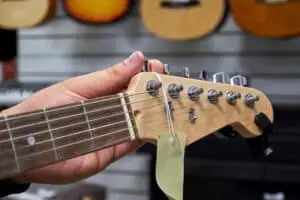
Are you thinking about picking up the guitar? Whether you’re a complete beginner or an experienced player looking to switch to a new instrument, learning guitar can be a great way to improve your musical skills.
But how fast can you learn guitar? And how long does it take to become proficient?
Learning to play the guitar can be a fun and rewarding experience, but it does take some time and effort to get good at it. How fast you learn depends on several factors, including how much practice you put in and how naturally talented you are.
Everyone learns at a different pace, and what might take one person a few weeks to learn could take another person months or even years. With dedication and practice, you can speed up your learning process and become a competent guitar player in a shorter amount of time.
This blog post will discuss how quickly you can learn guitar and some tips and resources that can help you speed up the learning process. Let’s get started!
How Long Does It Take To Learn Guitar?

There is no definitive answer to how long it takes to learn guitar. This depends on the person’s level of ability, practice, and motivation.
For beginners, it is essential to have realistic expectations. It is possible to learn a few basic chords and strums in a relatively short period, but it takes much longer to become able to play intermediate or advanced songs.
Most guitar teachers recommend that students practice for at least 30 minutes per day. This may seem like a lot, but it can be broken up into shorter sessions throughout the day.
With regular practice, beginners can learn to play basic guitar songs within 2-3 months. It typically takes 6-8 months to feel confident playing intermediate and slightly more advanced songs.
The following chart will guide how long it generally takes to learn guitar, based on various ability levels.
| Ability Level | Required Hours | 30 mins per day | 1h per day | 2h per day | 4h per day |
| Basic | 310-315 | 1.8 years | 10 months | 5 months | 78-80 days |
| Beginner | 620-625 | 3.5 years | 1.8 years | 10 months | 5 months |
| Intermediate | 1240-1250 | 7 years | 3.5 years | 1.8 years | 10 months |
| Expert | 5000 | 28 years | 14 years | 7 years | 3.5 years |
| Professional | 10000 | 56 years | 28 years | 14 years | 7 years |
The important thing is to enjoy the process and not get too discouraged if you don’t see progress as quickly as you’d like.
Learning Never Stops
As any musician knows, learning to play an instrument is a lifetime commitment. Even once you’ve mastered the basics, there’s always something new to learn. That’s why top musicians are always practicing, practicing, and practicing.
They know that the only way to get better is to put in the hours. In fact, according to Malcolm Gladwell’s 10000 hours rule, it takes that amount of time to become an expert at anything. So if you’re thinking of picking up a guitar, be prepared to commit to a lifetime of learning.
But don’t worry – it’ll be worth it when you can impress your friends with your mad guitar skills! Who knows, maybe you’ll be able to play like your favorite guitarists one day.
How Quickly Can I Learn a Song on Guitar?
How quickly you can learn a song on guitar depends on several factors, including how complex the music is and how much experience you have playing the guitar. If you are a beginner, you will likely need to take some time to learn the basic chords before you can start playing a song.
However, once you know some basic chords, you should be able to pick up most songs relatively quickly.
Let’s say you want to learn the famous nursery rhyme “Twinkle Twinkle Little Star.” You might be able to learn the melody in an hour or so. Of course, you’ll need to practice it a few times before playing it flawlessly. But once you’ve got the hang of it, you’ll be able to play the song any time you want.
What if the Song Is Complicated?
If you’re trying to learn a more complicated song, it might take you a bit longer. More experienced guitarists may be able to learn a new song in just a few minutes, while those who are just starting may need to spend an hour or two practicing before they can play the song flawlessly.
No matter your experience level, though, learning a new song is always a fun and rewarding experience.
What Are the Best Ways To Learn Guitar?

There are many different ways to learn guitar, and there is no single “best” method. Different people learn best in different ways, so it’s crucial to find a learning method that works best for you.
Watch Online Video Lessons
One popular way to learn guitar is by watching online video lessons. Many great guitar teachers offer lessons online, and you can usually find lessons for any skill level, from beginner to advanced.
Use Guitar Learning Software
You can use the following best guitar learning apps.
- AmpliTube
- Yousician
- Ultimate Guitar: Chords & Tabs
- The Gibson App
- Songsterr Guitar Tabs & Chords
Get a Guitar Teacher
If you want more personal attention, you may want to consider getting a guitar teacher. A good guitar teacher will be able to teach you the basics, help you develop your skills, and give you feedback on your playing.
Read Guitar Books and Magazines
Another great way to learn guitar is by reading books and magazines. There are many great guitar instructional books available, and you can also find magazine articles with tips and lessons.
Whichever method you choose, make sure to practice regularly and persistently – with a bit of hard work, you’ll be playing like a pro in no time!
Conclusion
There is no one-size-fits-all answer to this question, as the amount of time it takes to learn guitar depends on various factors, such as your level of commitment, previous experience with other instruments, and natural aptitude.
Learning to play the guitar is a lifetime commitment, but it’s well worth it in the end. There are many different ways to learn guitar, so find the method that works best for you and stick with it.
Frequently Asked Questions
There is no such thing as “too late” when it comes to learning guitar. No matter your age, you can always learn how to play.
Acoustic guitars are typically more challenging to learn than electric guitars, as they have heavier and longer strings that can be more difficult for beginners to finger.









